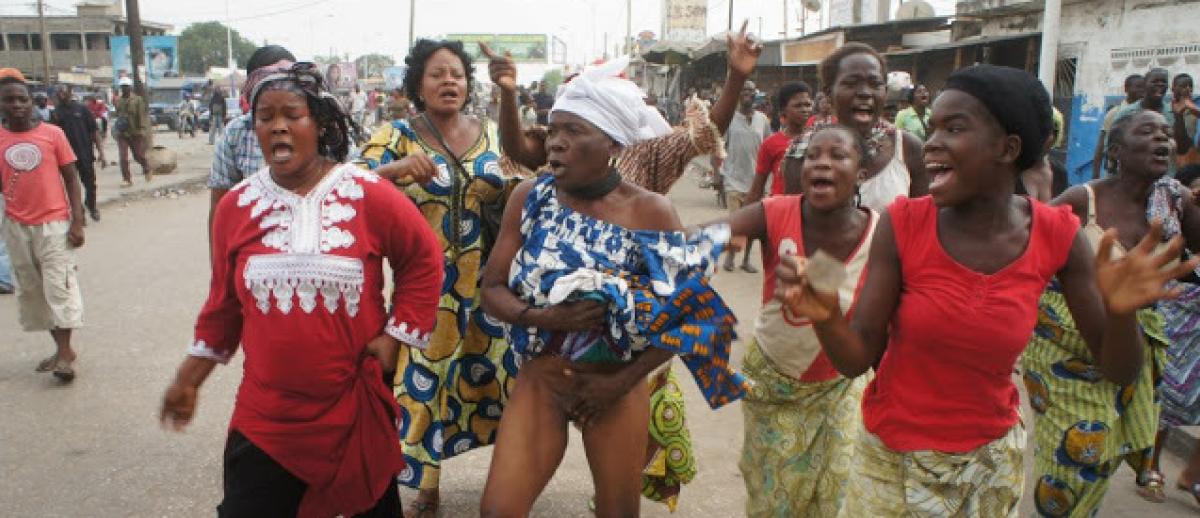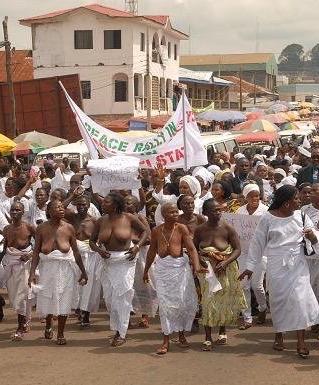The Disenchantment of Civil Society in the New Global Postcolony
archive


Togolese women protest demanding the resignation of President Faure Gnassingbe, September 2017. (Source: ghananet.com.gh)
The Disenchantment of Civil Society in the New Global Postcolony
The NGO-ization of Africa during the 1990s filled the gaps in social services as states across the region were bankrupted by the brutal policies of structural adjustment. But these humanitarian interventions also contributed to reinforcing an “old lie,” modernizing the colonial portrait of Africa as “old primitive, dying societies which, left to their own devices, would have probably ended up committing suicide” (Mbembe 2007 n.p.). From such a perspective, the idea of an indigenous, that is to say extra-colonial, form of civil society in Africa is inconceivable.
Today’s new global postcolony is being shaped by a strengthened neo-liberal strategy: increased deregulation, privatization, and free trade. This new world order is still based on the premise that law or justice “could only be law that ‘the European conquerors imported and established’” (Mbembe 2017, 59). In Africa local ‘voluntaristic associations’ are increasingly necessary as adjuncts to the state, but they are also increasingly supported by transnational organizations or international religious agencies with broader spatial reach. Under these de-territorialized conditions of rule-making and governance, the trope of civil society may function at best as “a new alibi for old-style ‘humane’ imperialism” (Comaroff and Comaroff, 1999, viii). At worst, such top-down interventions exemplify what Mbembe calls “the banality of violence” embedded in the political machinery of globalization. Such civil society is decidedly uncivil: “Foreign corporations, powerful nations, and local dominant classes all in turn present themselves as helping … in order to help themselves to the riches and raw materials of countries thrown into chaos" (2017, 5). While one might balk at criticizing humanitarian efforts in desperate times characterized by radical uncertainty and social volatility, the lack of grounded local engagement calls for a critique (Mbembe in Goldstone and Obarrio 2016, 222). More than mere civic-minded community, a public-spirited citizenry working cooperatively in the public interest as a complement to the state, what is required is a form of civil disobedience that can cut through the pervasive coercion of this new world order, what Homi Bhabha called “critique engagée” (1994, 33). In this essay I will suggest that an indigenous African form of civil society does exist, which offers just such a critique. It provides a profound vision for the restoration of African governance from the bottom up. It is based on an ancient and widespread phenomenon that I call “Female Genital Power,” or FGP (Grillo, 2018).
For centuries and across the continent, whenever calamity threatens, postmenopausal women protect society by deploying a religious rite to curse witches and throw off evil. They strip naked and slap their genitals and bare breasts, wield branches, and pound the ground with pestles. In this act of conjuration the female sex is the seat of spiritual power, and this ritual appeal is considered so potent that it is taboo to view. The female elders are understood to be the living embodiment of the ancestors who founded society on moral grounds. Known as the Mothers, they bear ultimate authority as the arbiters and defenders of social justice. Therefore, the ritual appeal to their genital power has also been traditionally deployed to condemn violations of the moral order. The women would come out to condemn abuses of power by secular authority, effectively checking chiefs and kings. During the era of European colonialism in Ghana, Côte d’Ivoire, Nigeria, Cameroon, and elsewhere in West Africa, multi-ethnic coalitions of women supported struggles for national liberation with collective manifestations of FGP. Today African women continue to execute this ritual rebuke against the contemporary postcolonial state and especially the violence of civil war. When performed in public as protest, FGP is a shocking and therefore effective act of spiritual warfare. Confronted with the taboo spectacle, even armed forces have been known to flee. The Mothers’ ritual chastisements do not aim at gaining representation in the halls of government, but rather they demand state accountability. They seek the restoration of just and peaceful governance for the good of the whole. The vitality of FGP as critique engagée was exhibited during Côte d’Ivoire’s last decade, dominated by civil war.
Under de-territorialized conditions of rule-making and governance, the trope of civil society may function at best as “a new alibi for old-style ‘humane’ imperialism.”
In the 1990s Côte d’Ivoire’s once enviable economic prosperity and political stability collapsed, leading to civil war in 2002. Northern Muslim rebels fought against the government forces and the largely Christian southern region for control of fertile territories and cash crops. The country was divided along ethnic lines, as much as by political party and religious affiliation. In a notorious incident at the outset of war, five Baulé women began to perform their traditional rite of FGP continuously to defend against the cataclysm of rebel violence, but were kidnapped and killed by those forces. Although the war was officially quelled, the political hostilities and violent skirmishes continued for a decade, culminating in post-election violence and a second civil war in 2011. Rebels and government forces alike targeted their opponents and subjected them to horrific violence. The most rampant form of assault during the war was rape and other forms of sexual violence. Throughout the decade, Ivoirian women regularly organized public uprisings to protest the subjugation of the populace to the wonton barbarism of the warring factions, and elders regularly stripped in indignation over the brutal incursions.

Protest in Ekiti, Nigeria, in September 2009 over gubernatorial election fraud.
In his classic essay, “Provisional Notes on the Postcolony,” Achille Mbembe charges that the stranglehold of such horror is the end result of what he calls “the little secret” of postcolonial dynamics. The state turns itself into a fetish and “keep[s] the people under the spell of the commandement, within an enchanted forest of adulation” (1992, 11). The (ex-)colonized are literally enthralled, enslaved by a fiction that liberated nationhood brings modernity, development, and self-determination. Mbembe asks, “Does not the colony produce in the colonized a dreamworld that turns rapidly into a nightmare?” (119). When such chimera cannot be realized under the new conditions of globalization the dream collapses into the nightmare of civil war.
In his more recent work, Critique of Black Reason (2017), Mbembe proposes that liberation from the spell “requires that an original symbolic matrix (tradition) ... be restored to the subject” (105), one that can “awaken slumbering powers” (173-4) in the populace. The Mothers’ jarring remonstrance is the matrix—a “matri-archive”—on which the women draw to do this work. African women elders counter the “little secret” of the postcolony with a secret of their own: that the most intimate (secret) core of their bodies is the seat of a terrible spell of retributive justice. The elders’ brazen nudity and exposure of women’s “secret parts” is a deliberately uncivil breach of decorum that overturns the dominant view of power. FGP “displaces the ‘regular’ political discourse with a ‘supernatural’ one that warns of the danger of neglecting moral authority in the wrangling for mere power” (Grillo 218, 235). The embodied curse is a form of disenchantment, both in the sense of an expression of disapprobation of political violence, and the literal sense, as a supernatural means to release the public from the thrall of its evil spell.
The female elders are understood to be the living embodiment of the ancestors who founded society on moral grounds. [T]hey bear ultimate authority as the arbiters and defenders of social justice.
The Mothers’ ritual activism “refutes dissembling forms of nationalism that replace moral foundations with the promises of modernity, and rejects the forces of globalization that dismiss local values” (Grillo, 2018, 236). It holds up a mirror to the collective body and presents a restored portrait of African civilization, replacing the monstrous, distorted image of Africa projected onto it by colonialism. In this way it heals the psychic split—what Mbembe calls “the primorial displacement”—that drives the violence of civil war in the postcolony (2017, 105). The public performance of FGP also does this work by reactivating collective memory of local values. The rehearsal of this traditional ritual rhetoric is a means for re-collection, an act that remembers the original social order grounded in justice, and an act capable of “re-membering” (reassembling) the collective body that was split by civil war. By recollecting the matrix of moral knowledge and spiritual power, the women’s rite stirs public conscience to throw off the spell and resist injustice with moral might. African women’s menacing deployment of their spiritual weapon in the public sphere constitutes “civil society” as critique engagée. Standing entirely apart from the state, the Mothers’ act embodies a disenchantment whose critical posture literally conjures away the madness of the state’s spell. Moreover, it offers an alternative, local vision of “the good” around which it calls the public to rally.
Bhabha, Homi K. The Location of Culture. London; New York: Routledge, 1994.
Comaroff, John L., and Jean Comaroff. Civil Society and the Political Imagination in Africa : Critical Perspectives. Chicago: University of Chicago Press, 1999.
Grillo, Laura S. An Intimate Rebuke: Female Genital Power in Ritual and Politics in West Africa. Durham, N.C.: Duke University Press, 2018.
Mbembe, Achille, and Laurent Dubois. Critique of Black Reason. Durham: Duke University Press, 2017.
Mbembe, Achille. “Africa in Theory.” In African Futures: Essays on Crisis, Emergence, and Possibility, edited by Brian Goldstone and Juan Obarrio, 211–30. Chicago; London: The University of Chicago Press, 2016.
Mbembe, Achille. “Provisional Notes on the Postcolony.” Africa. Journal of the International African Institute (Edinburgh University Press) 62, no. 1 (March 1992): 3–37.
Steger, Manfred B. Globalization: A Very Short Introduction. Fourth. Oxford: Oxford University Press, 2017.



